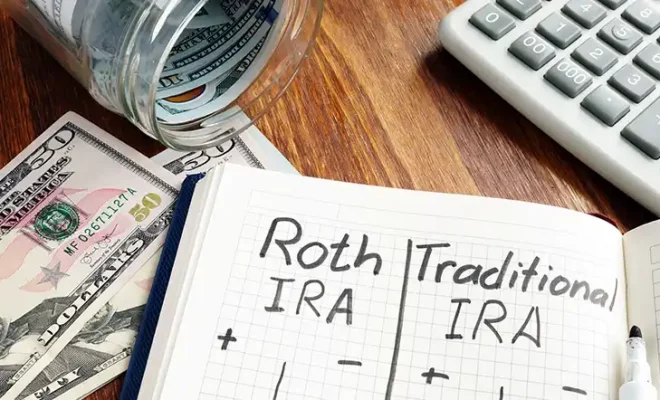A Guide to the Roth IRA 5 Year Rule
The Roth IRA (Individual Retirement Account) is a tax-advantaged retirement savings account wherein you contribute after-tax dollars, earn tax-free growth, and make tax-free withdrawals (subject to fulfilment of certain conditions). The Roth IRA is a popular retirement savings vehicle along with the 401(k) and the traditional IRA. It was first established in 1997. To make qualified tax-free withdrawals, you must have held your Roth IRA account for a period of five years and be 59.5 years of age at the time of withdrawal. If you foresee yourself being in a higher tax bracket in retirement, a Roth IRA would be an ideal option for you to minimise your taxability.
The Roth IRA 5-year rule is something you must be mindful of as it can make your withdrawals quite challenging. Therefore, to avoid any penalties, you need to strictly adhere to the 5-year rule of Roth IRA, as the guidelines are time-sensitive. To gain better insight into Roth IRAs and the Roth IRA 5-year rule, reach out to a professional financial advisor who can guide you on the same.
Read below to understand in detail the Roth IRA 5-year rule.
What is the Roth IRA 5-year rule?
The Roth IRA 5-year withdrawal rule states that you need to wait for at least five years before making any withdrawals from your IRA . The amount that you withdraw will be tax-free only if you hold your Roth IRA for five years after opening your account. The period starts as soon as you make your first initial contribution towards your Roth IRA account. The waiting period would be applied to other accounts once you open a Roth IRA and the five-year regulation kicks in.
However, you will have to fulfil specific requirements even after five years. If you want to make tax-free withdrawals from your Roth IRA, you must be 59.5 years old. Additionally, suppose you open a Roth IRA account when you are 58, you would need to complete five years before you are able to make tax-free withdrawals from the account. Hence, you need to meet both the age and the 5-year holding period requirement to make a tax-free withdrawal from the account.
Remember that the Roth IRA 5-year withdrawal rule follows the tax-year system. The tax year in the US runs from 1st January to 31st December. Below are a few additional rules that you must know about the Roth IRA 5-year rule –
- The rule applies only to the earnings from investments and not to the initial contributions that you make to the account.
- In case you make early withdrawals, there are chances that you can attract different taxes and penalties.
- Age is not a consideration factor, and the rule applies to all the account holders irrespective of their ages.
What are the exceptions to the Roth IRA 5-year rule?
Everything encompassed under the Roth IRA 5-year rule applies only to investment earnings. If you want to withdraw your contributions before the five years, you can easily do so without any obligations. If you withdraw your contributions, you can get access to that money without having to pay any taxes or penalties. However, it is crucial to keep all of your earnings in the account for a minimum of 5 years before you withdraw them, as only then will you not be charged any taxes and penalties. There are various circumstances in which you may be allowed to withdraw money from a Roth IRA without incurring a penalty such as:
- You can withdraw up to $10,000 in earnings from the account toward a down payment on a house.
- You may use your earnings to pay for higher education expenses for yourself, your spouse, kid, or grandchild.
- Any health-related expenses may qualify for an exemption along with any medical expenses that account for more than 10% of your adjusted gross income are eligible for reimbursement.
- You can also use your Roth earnings to pay for health insurance premiums provided you are unemployed at the time.
- You may be eligible for further exceptions if you become permanently disabled.
What is the Roth IRA conversion 5-year rule?
For Roth IRA conversions, the rules are slightly different. Each conversion has its five-year waiting period, rather than waiting five years after your initial Roth IRA investment. If you converted $20,000 to a Roth IRA in 2021, you wouldn’t be able to take qualified distributions until 2026. If you convert another $20,000 to a Roth IRA in 2022, you’ll have to wait another five years to make qualifying distributions until 2027.
What is the 5-year rule for inherited Roth IRAs?
The five-year restriction also applies to inherited Roth IRAs. All owners of inherited Roth IRA assets should double-check the date of the initial contribution, conversion, or rollover to avoid an unexpected tax payment in the coming tax season. If you are not the account owner’s spouse and inherit a Roth IRA, the SECURE Act mandates that you withdraw all the money deposited in the account within ten years. You can spread out withdrawals across your lifetime if you are the spouse. You can plan out your withdrawals efficiently to get the money required, and you don’t pay any taxes and penalties on the amount you withdraw.
What are the consequences of breaking the 5-year rule?
If you withdraw money from a Roth IRA which is less than five years old, the part of the withdrawal from investment earnings may be taxed and subject to an early withdrawal penalty. Your age, income, and length of account ownership will determine your penalty and tax amount.
You might anticipate paying a 10% penalty and income taxes on earnings distributed from the account if you’re under the age of 59.5 years and have owned the account for fewer than five years. You will not be charged any penalty on the earnings if you’re over 59.5 years old and have held the account for more than five years, but the amount will be reduced as it will be subjected to income taxes.
How can you avoid the Roth IRA early withdrawal penalty?
You can avoid any penalties that might be charged on withdrawals by deferring withdrawals from your IRA for a period till you reach the age of 59.5. You can withdraw any money from your IRA without paying the 10% penalty after you reach the age of 59.5. Each IRA withdrawal, however, will be subject to regular income tax.
If you utilise the money for major medical expenses, you may not have to pay the 10% penalty on an early IRA withdrawal. The early withdrawal penalty is not applicable on IRA distributions used to pay for medical expenses not covered by insurance and exceed 10% of your adjusted gross income. Add up the amount you paid for medical expenditures that have not been reimbursed in the year and subtract 10% of your adjusted gross income for the same year to arrive at a number you can easily withdraw from your IRA without penalty. The penalty exemption for medical expenses does not require you to itemise your taxes.
Also, college expenses can be paid with penalty-free IRA distributions. Tuition, fees, books, materials, and equipment are eligible expenses. If the student is enrolled in college full-time, room and board are also considered. Here, the person who will be availing of the education must be directly related to the account holder. The person can be the spouse, a child, or a grandchild of the account owner. Institutions that participate in the federal student aid programs are considered qualifying institutions. On the other hand, IRA withdrawals attract taxes that can reduce the amount at a student’s disposal.
Even a first-time home buyer can benefit from an early IRA withdrawal. Without incurring the early withdrawal penalty, you can withdraw up to $10,000 ($20,000 for couples) from an IRA to buy or develop your first home. You must not have owned a home two years before the acquisition to be eligible for the exception. Return the money to your IRA within 120 days following the distribution to avoid the penalty. A kid, grandchild, or parent can use an early IRA withdrawal to help them buy their first house.
In addition, new parents can now take penalty-free IRA distributions. Following the event of birth or adoption of a child, IRA owners will be able to withdraw up to $5,000 without penalty. This exception came into existence in 2020. The distribution of the funds must be made within one year after the birth or adoption of the child. If their financial situation improves, parents can reinvest the funds in the account to save for retirement.
IRA withdrawals are also tax-free for people with severe physical and mental disabilities who cannot work. You may need to show proof that your ailment prevents you from working. A physician will determine the severity (of the handicap). The conditions that qualify for the penalty exemption are typically predicted to last for a long time, be ongoing, or be indefinite, and result in death.
To summarise
The Roth IRA 5-year rule determines when the money can be withdrawn from the account so that you are able to make a tax-free withdrawal later in retirement. As an account holder, you need to take care of all the aspects discussed in this article before you decide to withdraw your earnings. However, you can withdraw your contributions without incurring a penalty as they are only applicable to the investment earnings. Make sure you go through all the terms and conditions properly before opening your Roth IRA.
Use the free advisor match tool to match with experienced and certified financial advisors who will be able to guide and advise you effectively on the different rules related to making tax-free withdrawals in retirement and explain the Roth IRA 5-year rule effectively. Give us basic details about yourself, and the match service will help connect you with 1-3 professional financial fiduciaries that may be suited to help you.













